The 10 Best Vitamin-rich Fruits You Should Consume In 2022
Vitamins are organic compounds that the body needs in small quantities to sustain life.
Vitamins are usually taken from food because the human body does not produce enough of the vitamins.
What Will We Learn?
Why Are Vitamins Important For Human Health?
Vitamins, which must be present in certain proportions in our body, have many functions in the functioning of the body, from the elimination of skin diseases to the regulation of metabolism, from the production of blood cells to bone development.
The vitamins that should be consumed in summer or winter months are listed below:
1. Apricot
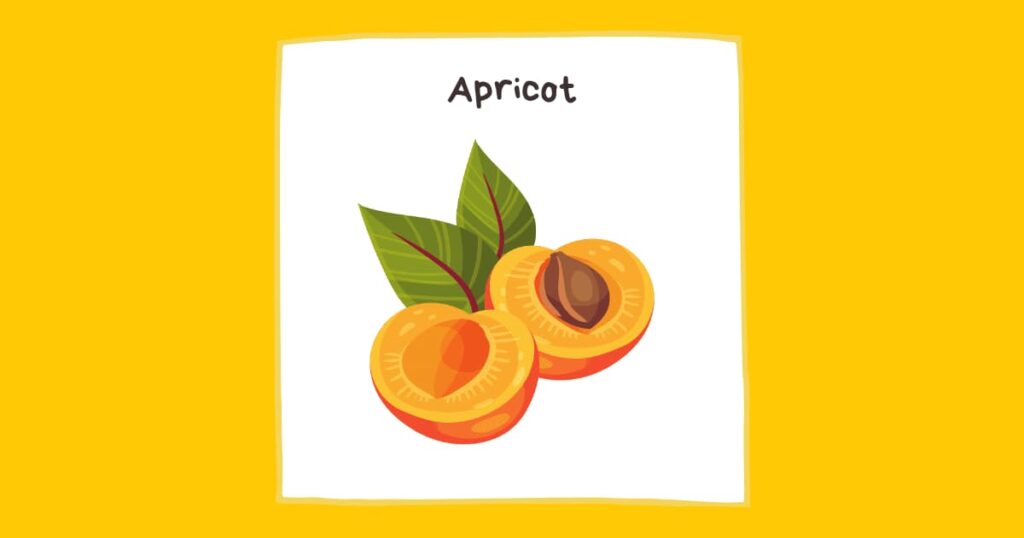
100 grams of apricots have the following nutritional value (% Daily Value*):
- Calories – 48
- Total Fat – 0.4 g
- Saturated fat – 0 g
- Cholesterol – 0 mg
- Sodium – 1 mg
- Potassium – 259 mg
- Total Carbohydrate 11 – g
- Dietary fiber 2 – g
- Sugar – 9 g
- Protein – 1.4 g
- Vitamin C – 16%
- Calcium – 1%
- Iron – 2%
- Vitamin D – 0%
- Vitamin B6 – 5%
- Cobalamin – 0%
- Magnesium – 2%
Apricots can be consumed dry or raw, as well as in the preparation of various fruit juices, jams and jellies.
Throughout its history, this fruit has been consumed frequently because it is very beneficial to health due to its unique organic compounds, nutrients, vitamins and minerals.
Apricot oil also has many health benefits.
According to the USDA National Nutrient Database, apricots are rich in vitamins A, C, K, E.
In addition, this fruit contains niacin, another substance that is good for health.
The mineral content of apricot is listed below:
- Calcium
- Phosphorus
- Manganese
- Iron and copper
Apricots are a good source of fiber and can help you fight constipation.
It is rich in minerals such as calcium, phosphorus, iron, manganese and copper and is beneficial for the health of your bones.
Eating apricots can help you prevent diseases such as osteoporosis, as well as benefiting the bone.
Apricots can help protect your heart from a variety of diseases such as heart attack, atherosclerosis, and stroke.
In addition to containing a high amount of vitamin C, it also contains dietary fiber and potassium, which is very beneficial for health.
Research by experts has found that antioxidants such as vitamin C can protect the heart from free radicals.
The potassium in apricot relaxes the tension of blood vessels and arteries.
This helps you to reduce blood pressure and reduce the pressure on the heart.
Fluid levels in the body are usually based on 1 minaret (potassium and sodium).
Apricot has these two minerals and can help distribute energy properly to muscles and organs.
It can help reduce cramps by maintaining electrolyte balance.
You can drip a few drops of apricot into the aching ear canal and wait for the effect.
Apricot may be good for ear pain, but since studies on this are still ongoing, it is useful to talk to your doctor before trying this method.
2. Apple
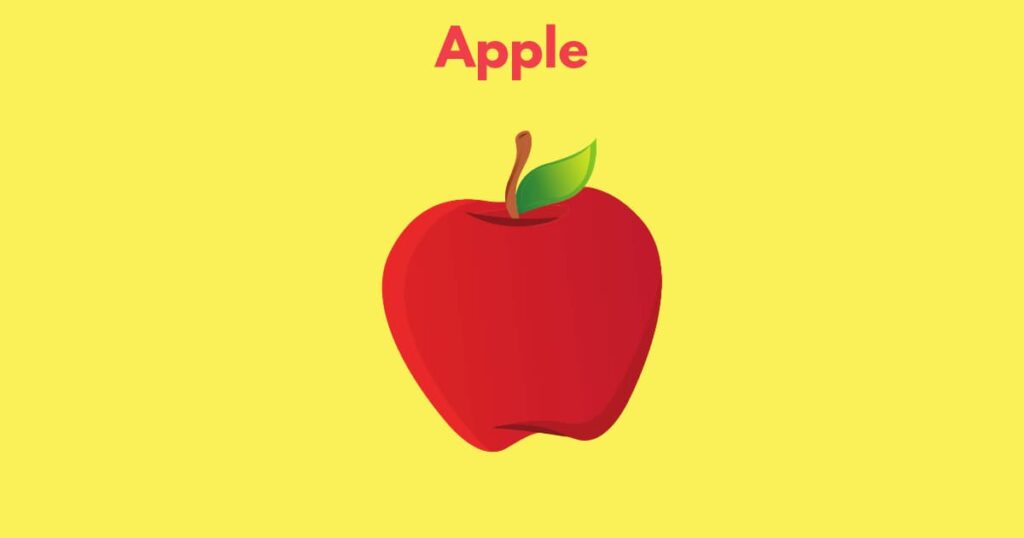
100 grams of apples have the following nutritional value (% Daily Value*):
- Calories – 52
- Total Fat – 0.2 g
- Saturated fat – 0 g
- Cholesterol – 0 mg
- Sodium – 1 mg
- Potassium – 107 mg
- Total Carbohydrate – 14 g
- Dietary fiber – 2.4 g
- Sugar – 10 g
- Protein – 0.3 g
- Vitamin C – 7%
- Calcium – 0%
- Iron – 0%
- Vitamin D – 0%
- Vitamin B6 – 0%
- Cobalamin – 0%
- Magnesium – 1%
Apples won’t replace your toothbrush, but biting and chewing on an apple boosts saliva production, lowering bacteria levels.
This will help you prevent tooth decay.
Studies have found that apple juice reduces the risk of Alzheimer’s disease.
It has also been found that apples can reduce the effects of aging on the brain.
Mice fed an apple-rich diet showed higher memory ability compared to mice fed a normal diet.
Mice fed the apple diet performed better in maze tests.
Experts from the American Association for Cancer Research found that flavonol-rich apples reduce the risk of pancreatic cancer by as much as 23.
In addition, some compounds in apple peel may protect against cancer cells in the colon, liver, and breast.
Studies have found that extracts from whole apples reduce the number and size of mammary tumors in Mice.
Apple is a high fiber source.
The National Cancer Institute recommends consuming foods high in fiber to reduce the risk of developing colorectal cancer.
Studies have found that women who ate at least 1 apple a day had a 28 percent lower risk of developing type 2 diabetes compared to women who did not eat an apple.
This is due to fruit pectin (a soluble fiber) found in apples.
It helps you to blunt blood sugar fluctuations.
The soluble fiber in apples combines with the fats in the gut, resulting in lower cholesterol levels.
The phenolic compound found in apple peel prevents cholesterol from solidifying on the artery walls.
If cholesterol solidifies in this wall, blood flow to the heart is reduced and the risk of developing coronary artery disease increases.
3. Banana

100 grams of bananas have the following nutritional value (% Daily Value*):
- Calories (kcal) – 88
- Total fat- 0.3 g
- Saturated fat – 0.1 g
- Cholesterol – 0 mg
- Sodium – 1 mg
- Potassium – 358 mg
- Carbs -23 g
- Dietary Fiber – 6.7 g
- Sugar – 12 g
- Protein – 1.1 g
- Vitamin C – 8.7 mg
- Iron – 0.3 mg
- Vitamin B6 – 0.4 mg
- Magnesium – 27 mg
- Calcium – 5 mg
- Vitamin D – 0 IU
- Cobalamin – 0 µg
If you can’t see growth in your muscles after training, bananas can help you in this regard.
This is because bananas are rich in magnesium.
Bananas can help you with muscle contraction, muscle relaxation and protein synthesis.
These 3 combinations increase lean muscle mass.
One of the best ways to get magnesium is to make banana tea.
Boil some water and cut the peel of the banana from both ends.
Boil for 7 to 10 minutes and then drink before going to bed.
Banana helps serotonin, known as the happiness hormone, to reach the brain faster.
Serotonin is one of the most important chemicals in the brain.
A lack of serotonin in the brain can cause anxiety and insomnia, as well as other mental problems such as fatigue, irritability, agitation, anger, and aggression.
Banana contains norepinephrine, which helps regulate stress.
Experts say that this substance can have positive effects on mental health.
The combination of low sodium and high potassium intake causes a decrease in blood pressure in individuals.
The low sodium and high potassium found in bananas can help you lower blood pressure, minimizing the risk of stroke.
Unripe bananas literally resist the digestive system, which can cause you to overeat.
The substance called resistant starch is what causes digestion to slow down.
It is also helpful in normalizing healthy gut bacteria by leading to more efficient fat oxidants.
Because unripe bananas can be bitter, it’s a better idea to mix them with other fruits and vegetables to make them taste better.
4. Blackberry
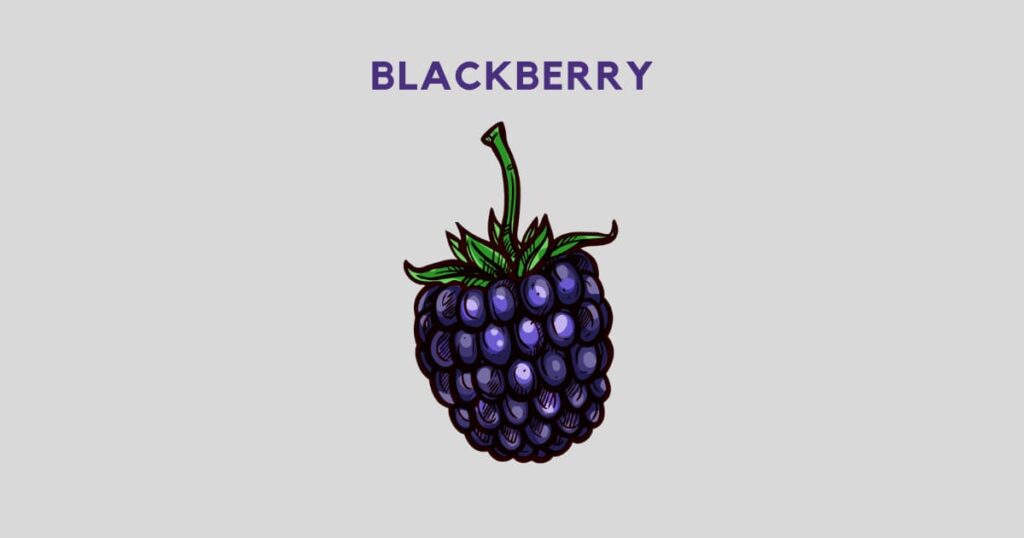
100 grams of blackberries have the following nutritional value (% Daily Value*):
- Calories – 43
- Total Fat – 0.5 g
- Saturated fat – 0 g
- Cholesterol – 0 mg
- Sodium – 1 mg
- Potassium – 162 mg
- Total Carbohydrate – 10 g
- Dietary fiber – 5 g
- Sugar – 4.9 g
- Protein – 1.4 g
- Vitamin C – 35%
- Iron – 3%
- Vitamin B6 – 0%
- Magnesium – 5%
- Calcium – 2%
- Vitamin D – 0%
- Cobalamin – 0%
Fiber is a substance known for its benefits to your digestive system.
A cup of blackberries contains more fiber than a cup of bran.
The fiber in blackberries keeps you full, which is a good way to avoid unhealthy snacks.
Blackberry is a type of fruit rich in antioxidants.
It fights against harmful oxygen-free molecules with flavonoids, phenolic acids and flavonols in its content and can help you to prevent their effects.
In short, blackberries act as a natural detox for the body.
Blackberries contain gallic acid, rutin, and ellagic acid, a natural phenol antioxidant, which, when eaten, kills bacteria in the mouth.
In studies conducted in 2012, the antibacterial properties of blackberries were tested on 10 different bacteria.
As a result of the research, it was concluded that blackberry can kill pathogens and has antivirus properties that help treat periodontal infections.
Anthocyanins, ellagic acid and cyanide-3-glucoside phytochemicals in blackberries can reduce the risk of developing cancer (Lung cancer, colon cancer and esophageal cancer).
The flavonols in blackberries have the feature of protecting the heart.
The high fiber level and magnesium protect the arterial vessels in the heart from blockages and help normalize blood flow.
High levels of magnesium help regulate blood pressure, as well as protect against the risk of heart attack.
Vitamins, minerals and phytoestrogens in blackberry increase immunity.
Blackberries are high in fiber and low in sugar, which means they will help you maintain a healthy weight.
Calcium and magnesium in blackberry help you to protect your bones.
As it is known, calcium strengthens bones and magnesium helps the absorption of potassium.
Blackberries are rich in vitamin K, which can help clot the blood.
5. Cherry

100 grams of cherries have the following nutritional value (% Daily Value*):
- Calories – 50
- Total Fat – 0.3 g
- Saturated fat – 0.1 g
- Cholesterol – 0 mg
- Sodium – 3 mg
- Potassium – 173 mg
- Total Carbohydrate – 12 g
- Dietary fiber – 1.6 g
- Sugar – 8 g
- Protein – 1 g
- Vitamin C – 16%
- Calcium – 1%
- Iron – 1%
- Vitamin D – 0%
- Vitamin B6 – 0%
- Cobalamin – 0%
- Magnesium – 2%
The human body contains a molecule called free radical.
Free radicals are produced due to harmful environmental factors such as radiation or air pollution.
If too many free radicals are produced, they can cause damage to human organs, disease and aging.
Antioxidants in cherries help you regulate free radicals.
Studies have found that consumption of sweet cherries can increase sleep time.
The reason for this is the substance called melaton in the cherry.
Cherry consumption can be tried in diseases such as gout and joint pain.
Consumption of cherries normalizes the amount of uric acid in the blood, which helps you get rid of gout attacks.
Another of the health benefits of cherries is that it helps you in lowering cholesterol.
Studies have proven that cherries reduce blood VLDL (bad) levels and improve triglyceride and HDL (good) cholesterol levels.
Animal tests have been done to prove the effects of cherries on heart health, and cherry extract has been found to reduce liver triglycerides.
Scientific research has found a decrease in blood pressure in people who consume cherries.
A large part of your heart health depends on your blood pressure and cholesterol.
Adding cherries to your diet in moderate amounts will benefit you.
If you have type 2 diabetes, there is no harm in consuming cherries in moderate amounts.
It is an ideal carbohydrate source due to its cherry content.
Since this fruit has a low glycemic index, it becomes a good snack for diabetics.
This is because foods with a low glycemic index do not cause an increase in blood sugar and do not cause an insulin response.
Also, the polyphenols found in cherries can help you reduce oxidative stress and hyperglycemia.
Cherries are a fruit that is often consumed for mental health.
Sweet cherries can help reduce anxiety by lowering cortisol levels.
Scientific studies have found that cherries have a positive effect on mood.
By adding a moderate amount of cherries to your diet, you can boost your mood and reduce your anxiety.
6. Grapefruit
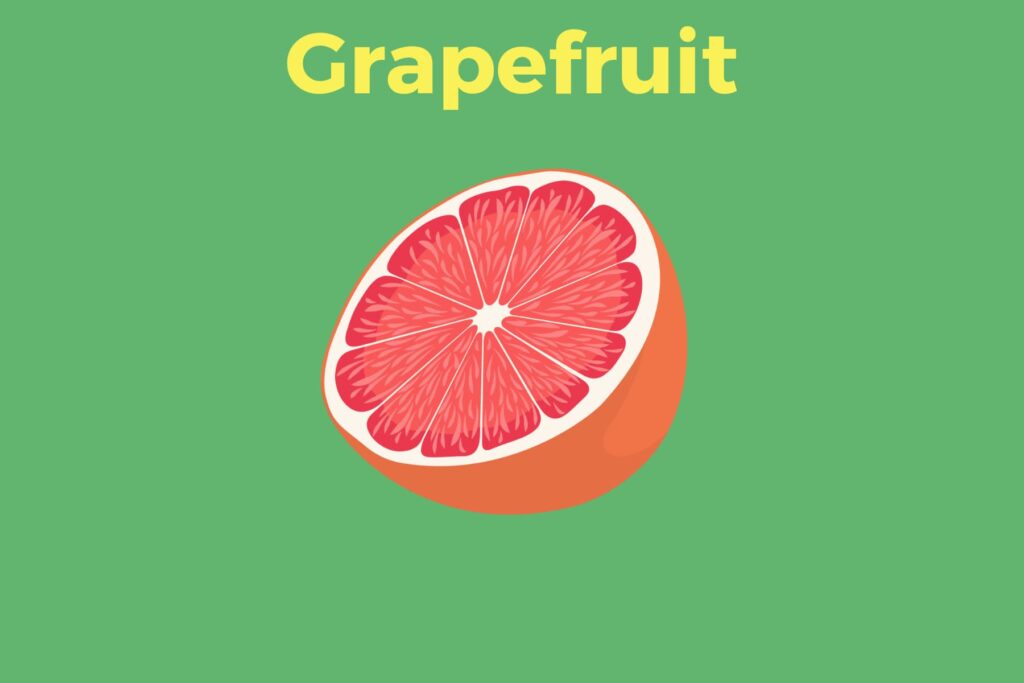
100 grams of grapefruits have the following nutritional value (% Daily Value*):
- Calories (kcal) – 42
- Total fat – 0.1 g
- Saturated fat – 0 g
- Cholesterol – 0 mg
- Sodium – 0 mg
- Potassium – 135 mg
- Total Carbohydrate – 11 g
- Dietary fiber – 1.6 g
- Sugar – 7 g
- Protein – 0.8 g
- Vitamin C – 52%
- Calcium – 2%
- Iron – 0%
- Vitamin D – 0%
- Vitamin B6 – 5%
- Cobalamin – 0%
- Magnesium – 2%
Grapefruit is a very rich food in terms of vitamin C.
Even just half of the grapefruit contains 52% of the daily vitamin C intake.
Vitamin C plays an important role in strengthening our body’s immune system.
Vitamin C has antioxidant properties and protects your body from harmful bacteria (viruses).
It plays an important role in preventing the risk of heart disease and cancer.
In addition, grapefruit contains a lot of vitamin A.
Getting enough vitamin A can protect you against macular degeneration and other diseases.
Vitamin A also helps to strengthen the immune system against inflammation in the body.
Vitamin A, which is found in half of the grapefruit, meets 28% of the daily vitamin need.
Grapefruit can also help you lose weight because it is high in fiber.
Losing weight can help you prevent diseases such as diabetes, cancer and heart disease.
Instead of eating processed foods and gaining weight, you can keep your weight in the desired range by eating grapefruit.
Care should be taken when using this fruit as it may interact with some medications.
Consume this fruit in consultation with your doctor, especially in case of abnormal heart, blood pressure, cholesterol, anxiety and the use of other prescription drugs.
7. Grape

100 grams of grapes have the following nutritional value (% Daily Value*):
- Calories – 67
- Total Fat – 0.4 g
- Saturated fat – 0.1 g
- Cholesterol – 0 mg
- Sodium – 2 mg
- Potassium – 191 mg
- Total Carbohydrate – 17 g
- Dietary fiber – 0.9 g
- Sugar – 16 g
- Protein – 0.6 g
- Vitamin C – 6%
- Calcium – 1%
- Iron – 1%
- Vitamin D – 0%
- Vitamin B6 – 5%
- Cobalamin – 0%
- Magnesium – 1%
For over 20 years, studies have been done on grapes and many of their health benefits have been found.
This fruit contains more than 1600 natural compounds, including antioxidants and other polyphenols.
Grape polyphenols have antioxidant properties, which affect important biological processes in the body and help cell healing.
This fruit can be of great help to you when it comes to cardiovascular health.
Grapes support healthy blood lipid profiles, are effective against inflammation and can help you prevent oxidative stress.
Grapes do not contain saturated fat and cholesterol.
It is a heart-healthy snack as it contains very low sodium.
Scientific studies in humans with colon cancer found that consuming grapes daily for two weeks reduced the expression of genes that cause tumor growth in the colon.
Experts say that grapes are healthy not only for the stomach but also for the colon.
Grapes are oil-free, low glycemic index and low-calorie natural food.
These benefits make this fruit a more nutritious food at an affordable price.
Scientific studies have found that consuming grapes for 2 weeks can protect you against UV rays.
8. Kiwi
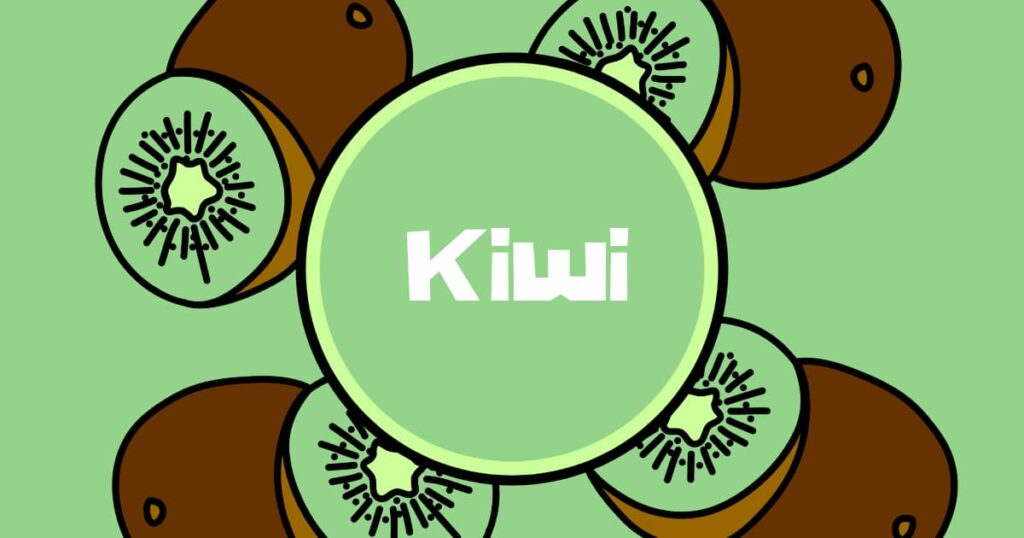
100 grams of kiwis have the following nutritional value (% Daily Value*):
- Calories – 61
- Total Fat – 0.5 g
- Saturated fat – 0 g
- Cholesterol – 0 mg
- Sodium – 3 mg
- Potassium – 312 mg
- Total Carbohydrate – 15 g
- Dietary fiber – 3 g
- Sugar – 9 g
- Protein – 1.1 g
- Vitamin C – 154%
- Calcium – 3%
- Iron – 1%
- Vitamin D – 0%
- Vitamin B6 – 5%
- Cobalamin – 0%
- Magnesium – 4%
Like the other fruits listed above, kiwi plays an important role in strengthening the immune system.
By strengthening our immune system during the winter months, we can keep bacteria and germs away from our body.
Kiwi is rich in vitamin C and is an excellent source of iron, vitamin B9.
This fruit is often consumed to prevent fatigue.
Did you know that the amount of vitamin C in kiwi is higher than the amount of vitamin C found in oranges?
Did you know that if you eat 1 kiwi, you can meet all your daily vitamin C needs?
Eating 1 kiwi in the morning can be a good idea to start the day.
In addition, vitamin C is very useful for bones.
Kiwi is a low-calorie food type.
If you want to stay in the forum, you can consume kiwi.
If you search the internet, you can find a lot of articles about the kiwi diet.
This fruit is low in fat and contains fructose, a naturally occurring sugar.
Kiwi is a fruit that gives a feeling of fullness.
Like the fruits listed above, kiwi is a fruit with a high fiber content.
It contains actinidine, a natural enzyme to aid in the digestion of proteins in the body.
If you include a moderate amount of kiwi in your diet and drink the recommended amount of water throughout the day and do regular activity, you can get rid of minor digestive problems.
If you eat 100 grams of kiwi, you will get an average of 3 grams of dietary fiber to your body.
The antioxidants in kiwi prevent the oxidation of cells.
This, in turn, can reduce the risk of cancer and cardiovascular disease.
9. Lemon

100 grams of lemons have the following nutritional value (% Daily Value*):
- Calories – 29
- Total Fat – 0.3 g
- Saturated fat – 0 g
- Cholesterol – 0 mg
- Sodium – 2 mg
- Potassium – 138 mg
- Total Carbohydrate – 9 g
- Dietary fiber – 2.8 g
- Sugar – 2.5 g
- Protein – 1.1 g
- Vitamin C – 88%
- Calcium- 2%
- Iron – 3%
- Vitamin D – 0%
- Vitamin B6 – 5%
- Cobalamin – 0%
- Magnesium – 2%
Lemons are a natural medicine that has been used in medicine for centuries and is good for human health both externally and internally.
Lemons contain plenty of vitamin C, which helps us strengthen our immune system.
Lemons contain flavonoids, apart from vitamin C.
Scientific studies have found that these compounds can reduce oxidative stress.
The antioxidants in lemon slices help your body fight free radicals.
Lemon juice may not help you fight bad eating habits, but it does help support your metabolism.
Scientific studies have found that consuming lemon juice can help you with obesity and citrus flavonoids can help you with insulin resistance.
Never drink lemon juice if you have low blood pressure.
You can consume lemon juice to prevent kidney stone formation.
Kidney stones form as a result of calcium deposits in the kidneys.
The citrate in lemon juice prevents calcium from accumulating in the kidneys.
Since lemon helps the production of collagen, you can take care of your skin by adding lemon juice to your water.
This will help your skin feel better and look better.
It would be a better idea to use fresh lemon juice rather than bottled lemon juice.
Because vitamin C loses its effectiveness when exposed to too much air.
Bottled lemon juices are heated and placed on the shelves.
This in turn kills the healthy enzymes found in lemon juice.
Fresh lemons can be hard to find, but it’s worth it.
10. Mango

100 grams of mangos have the following nutritional value (% Daily Value*):
- Calories – 60
- Total Fat – 0.4 g
- Saturated fat – 0.1 g
- Cholesterol – 0 mg
- Sodium – 1 mg
- Potassium – 168 mg
- Total Carbohydrate – 15 g
- Dietary fiber – 1.6 g
- Sugar – 14 g
- Protein – 0.8 g
- Vitamin C – 60%
- Calcium – 1%
- Iron – 1%
- Vitamin D – 0%
- Vitamin B6 – 5%
- Cobalamin – 0%
- Magnesium – 2%
Mango is rich in vitamins C and E, Amino acids, flavonoids, beta-carotene, niacin, iron, magnesium and potassium.
It is estimated that just two hundred grams of mago contains about 60 mg of vitamin C.
There are 2.3 grams of vitamin E in 200 grams of mango.
Mango meets 23% of the daily recommended intake of vitamin E.
It also meets 10% of the daily recommended magnesium and potassium.
Phenols such as isoquercitrin, quercetin, astragalin, physic, gallic acid and enzymes in the fruit can help you prevent cancer.
It is a fruit rich in soluble dietary fiber called pectin.
Scientific studies have found that it is effective in preventing prostate cancer thanks to its beta-carotene content.
It has also been found to be very effective in preventing the development of liver and colon cancer.
This fruit provides 25 percent of the daily recommended amount of vitamin A.
Vitamin A deficiency can cause blindness.
Consuming a reasonable amount of mango can help prevent night blindness, refractive errors, dry eyes, softening of the cornea, itching and burning in the eyes.
In addition, if you consume mango regularly, you can reduce the risk of developing muscle degeneration.
The amount of iron in mango is good for pregnant women and people suffering from anemia.
Postmenopausal women experience weight loss.
For this reason, women experiencing menopause should eat mango and other iron-rich fruits.
Since mango contains glutamine acid, it stimulates memory and keeps cells active.
This makes this fruit a nice and tasty snack for kids.
Vitamins B6 and iron in mango contribute to the proper functioning of the brain.
